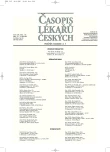Clostridial Sepsis and Gas Gangrene of the Abdominal Wall After Cholecystectomy
Klostridiová sepse a plynatá sněť břišní stěny po cholecystektomii
Klostridiová sepse je vzácnou komplikací po nitrobřišních operacích, v mnoha případech smrtelnou. V našem písemnictví byly podle námi dostupných informací dosud publikovány pouze dvě práce popisující klostridiovou sepsi jako pooperační komplikaci celkem u 4 pacientů, z nichž pouze jediný přežil. Autoři předkládají kazuistiku pacienta operovaného pro cholecystolitiázu a obstrukční ikterus, u něhož došlo do 48 hodin po cholecystektomii k rozvoji klostridiové sepse a plynaté sněti břišní stěny, které byly úspěšně zvládnuty.
Klíčová slova:
klostridiová sepse, plynatá sněť břišní stěny, cholecystektomie.
Authors:
P. Lochman 1,2; K. Kabeláč 2; I. Pospíšil 2; D. Dobeš 1,2; R. Čáp 1,2
Authors‘ workplace:
Katedra válečné chirurgie, Fakulta vojenského zdravotnictví Univerzity obrany, Hradec Králové
1; Chirurgická klinika FN, Hradec Králové
2
Published in:
Čas. Lék. čes. 2007; 146: 614-616
Category:
Case Report
Overview
Clostridial sepsis is a rare complication after intraabdominal operations, mostly fatal. According to our knowledge only two papers describing clostridial sepsis as postoperative complication in 4 patients were published in the Czech literature, only one of them survived. Authors present a case report of patient operated on for cholecystolithiasis and obstructive icterus where within 48 hours after cholecystectomy the clostridial sepsis and gas gangrene of the abdominal wall developed and that were successfuly managed.
Key words:
clostridial sepsis, gas gangrene of the abdominal wall, cholecystectomy.
Labels
Addictology Allergology and clinical immunology Angiology Audiology Clinical biochemistry Dermatology & STDs Paediatric gastroenterology Paediatric surgery Paediatric cardiology Paediatric neurology Paediatric ENT Paediatric psychiatry Paediatric rheumatology Diabetology Pharmacy Vascular surgery Pain management Dental HygienistArticle was published in
Journal of Czech Physicians

- Advances in the Treatment of Myasthenia Gravis on the Horizon
- Possibilities of Using Metamizole in the Treatment of Acute Primary Headaches
- Metamizole vs. Tramadol in Postoperative Analgesia
- Metamizole at a Glance and in Practice – Effective Non-Opioid Analgesic for All Ages
- Spasmolytic Effect of Metamizole
-
All articles in this issue
- Homage to McKusick’s „Mendelian Inheritance in Man“ McKusick’s database MIM has grown since its early beginning in sixties
- Milestones of Cardiovascular Therapy. IV. Reserpine
- Ten Years Since the Successful Introduction of the First Monoclonal Antibody (Rituximab) into the Therapy of Lymphomas
- Proteomics Techniques and their Application in Haematological Malignancies
- Use of Capillary Electrophoresis in the Clinical Research
- Thrombembolic Complications of Sepsis and Their Pharmacological Prophylaxis
- The Information Value of Detection of Borrelia Antibodies in the Healthy Blood Donors and in the Population at Risk
- Comparison of the Activities of the Elderly in Homes of Seniors in 1989 and 2000
- Clostridial Sepsis and Gas Gangrene of the Abdominal Wall After Cholecystectomy
- Journal of Czech Physicians
- Journal archive
- Current issue
- About the journal
Most read in this issue
- Milestones of Cardiovascular Therapy. IV. Reserpine
- Clostridial Sepsis and Gas Gangrene of the Abdominal Wall After Cholecystectomy
- Use of Capillary Electrophoresis in the Clinical Research
- Ten Years Since the Successful Introduction of the First Monoclonal Antibody (Rituximab) into the Therapy of Lymphomas
